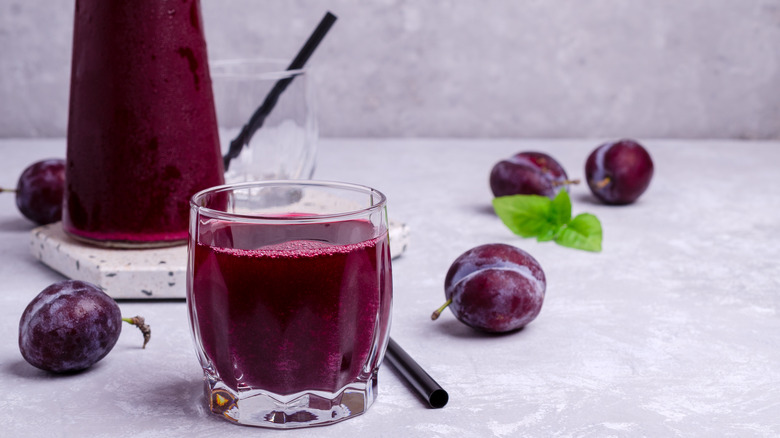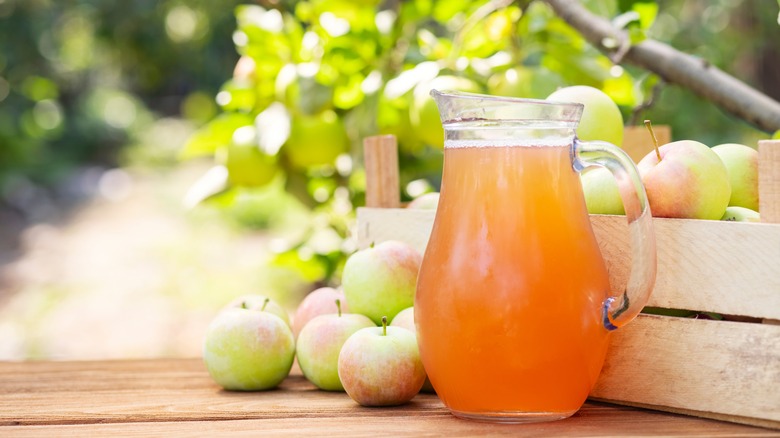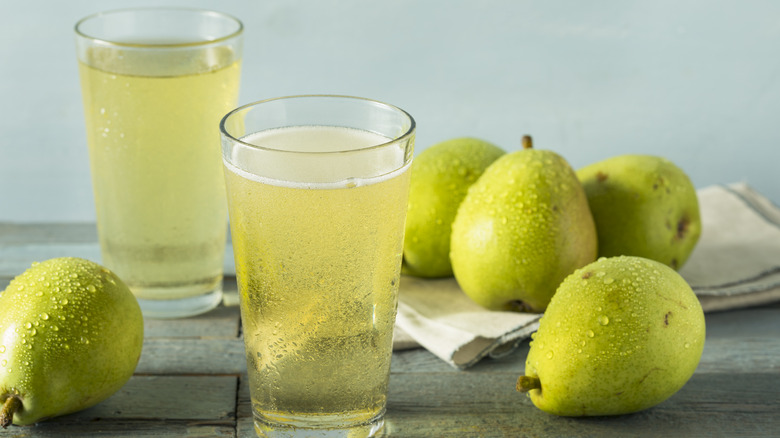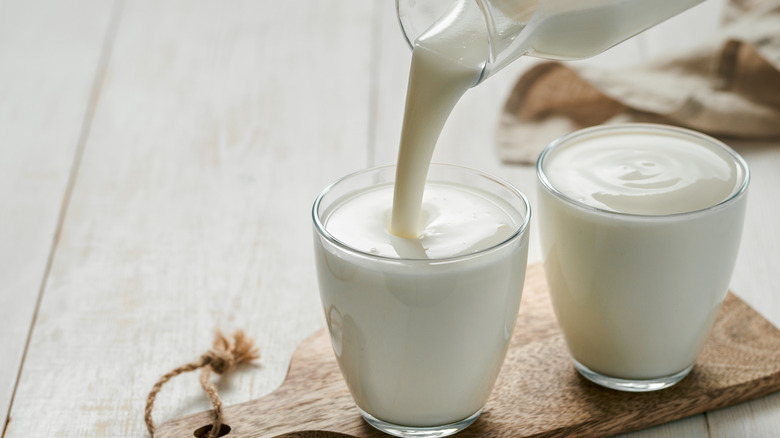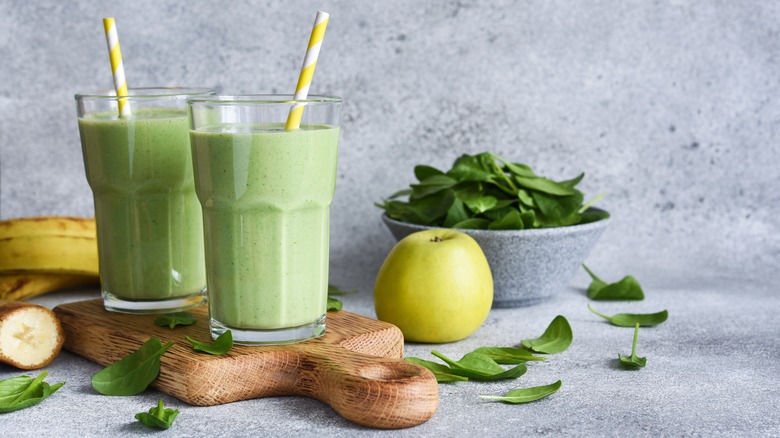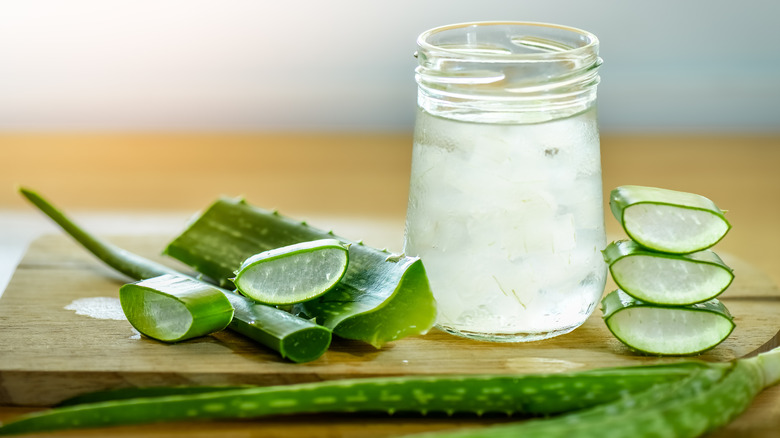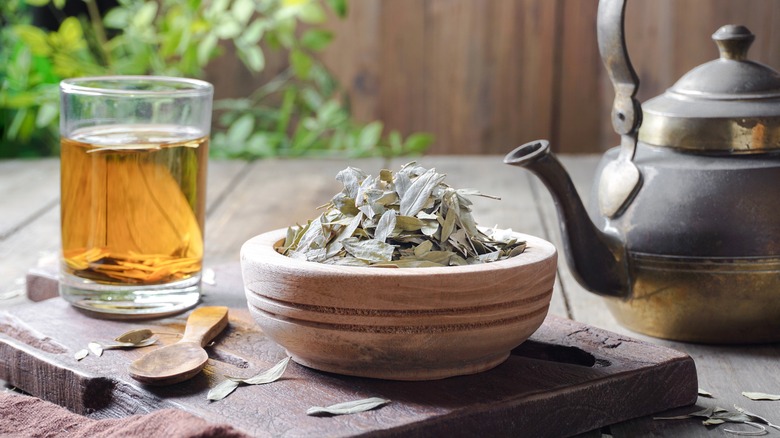Beverages That Can Make You Poop Fast (That Aren't Coffee)
It's like clockwork: Almost as soon as you set down your finished mug of hot coffee, it's time to head to the bathroom. But is it possible to get the same end result without the jittery rush and caffeine comedown so often linked with coffee? Some of us rely on that morning cup of joe to get things moving. This is no surprise, given that about 2.5 million people visit their doctor every year because of symptoms of constipation, according to the Cleveland Clinic.
Constipation is one of the most common digestive issues across the United States. Symptoms can include painful bowel movements; dry and hard stools; and that "full," uncomfortable, bloated feeling that just won't go away. Specifically, constipation is defined as only having 0 to 2 bowel movements per week. Now, before you start diagnosing yourself, keep in mind that everyone has a unique bowel movement cycle. Some folks poop a couple of times a day, while others go once a day, or even once every other day. However, it's time to schedule a visit with your healthcare provider if your regular bowel pattern starts to become irregular.
Some diet and lifestyle factors can help support your digestive system's health and encourage bowel movements. A few common culprits of constipation include low fiber in your diet, eating too much dairy, dehydration, stress, and certain medications. Luckily, there are lots of drinks you can count on — besides coffee — that can help you go number two.
Prune juice
All hail prune juice! This juice is one of the most popular natural remedies for constipation out there. Prunes often have a bad reputation since they look a little less-than-desirable, but actually, prunes are sweet and delicious, as they are simply dried plums. Plus, they're packed with nutrients, including iron, potassium, and vitamins A, C, K, and B6. Most importantly, prunes contain a high amount of sorbitol, a type of sugar alcohol that makes them act as a natural laxative. Bonus: prunes also have lots of fiber, so eating prunes instead of drinking the juice (which doesn't have as much fiber), provides an extra boost of fiber to help you poop.
According to a 2013 study published in Critical Reviews in Food Science and Nutrition, dried prunes and prune juice can help prevent constipation and may even reduce the risk of colon cancer. The study also suggests that prunes can help with addressing obesity, diabetes, and linked cardiovascular diseases. In addition, a 2014 study in Alimentary Pharmacology & Therapeutics found that prunes performed better at easing constipation than another common constipation go-to supplement, psyllium husk.
Apple juice
If the thought of prune juice just makes you cringe, you may be delighted to hear that there are other fruit juice options out there that can also help you poop. Apple juice is often recommended by doctors to concerned parents hoping to ease their child's constipation, but it also works for adults! Apple juice also contains sorbitol — the same sugar alcohol found inside prunes — albeit not as much (via Johns Hopkins Medicine). Still, it's enough to help stimulate bowel movements and relieve constipation.
Apples are also high in water content, which can help ease constipation, especially if it is linked to dehydration. Apples also contain a plant fiber called pectin, which is a soluble fiber that can help support digestive health and promote regular bowel movements. Unfortunately, most apple juice on store shelves filters out this fiber. But if you have a juicer or blender at home, you can make your own apple juice and try to keep some of the fiber in your juice as you filter it or don't filter it at all.
Pear juice
Pear juice is quite similar to apple juice when it comes to flavor. However, there is one big difference: pear juice is actually higher in sorbitol compared to apple juice, according to a 2015 study in Nutrition Today. Sorbitol works to discourage constipation by drawing fluid into your intestines, which can help soften stool and stimulate its movement, as explained by Cornell Health. Since constipation is often linked with a lack of fluids in the body and dry stool, sorbitol helps address this issue two-fold. The study suggests that, when paired with a healthy fiber intake, pears can help relieve constipation and even promote digestive health.
Pears are also a great source of nutrients, with high levels of antioxidants, folate, vitamin C, copper, and potassium. It's important to not overdo it, though, and avoid chugging an entire jug of pear juice. High consumption of sorbitol can cause fluid and electrolyte imbalances, so it's best to practice moderation, stick to a glass, and hope for the best.
Lemon and water
Sometimes, a simple, tall glass of water with a squeeze of lemon is enough to stimulate a bowel movement. Most of us have been told at least once in our lives that drinking water is good for us. Hydration is essential for maintaining the balance of fluids in the body, which is crucial for digestive health. Water helps prevent constipation by softening stools, helping them move more easily through the intestines.
On top of all the advantages of drinking water, adding a bit of lemon to it amplifies its benefits. "While drinking water can help us hit our hydration goals, infusing water with lemon is a very simple, quick task that boosts the function of water itself," registered dietitian Kylie Bensley told Vogue.
If you start your day with a glass of lemon water, it can help stimulate your digestive system and promote gut microbiome health. Lemon water helps keep things moving and brings water to the intestine and colon, soothing constipation. The antioxidants and vitamin C in lemons can also help boost your immune system. Bensley recommends drinking lemon water at room temperature for maximum benefits.
Kefir
Have you considered adding kefir to your diet? Kefir is a fermented milk beverage packed with probiotics and nutrients. Think of it as liquid yogurt, except kefir is considered superior to yogurt because it contains a wider variety of probiotics and is low in lactose, which is a win for folks who suffer from lactose intolerance.
Your digestive system is teeming with microorganisms and bacteria that help keep things running smoothly. Often called the gut microbiome, this system is a delicate balance of helpful and harmful bacteria working to transform food into nutrients for your body. If the balance gets off, "bad" bacteria take over, which can cause digestive distress like gas, bloating, cramps, diarrhea, and constipation. Probiotics help keep these harmful bacteria in check and your gut microbiome balanced.
In a 2014 study published by the Turkish Journal of Gastroenterology, the probiotics in kefir were found to help reduce the symptoms of constipation. The study also confirmed that kefir supports the digestive system and eases digestive complaints. Kefir is often touted as a "superfood" because it is a powerhouse of vitamins, minerals, and nutrients, containing protein, calcium, magnesium, and vitamins B2, B12, and D. These nutrients help support bone and muscle health, balance blood sugar, and may even help ease stress, according to the Cleveland Clinic.
Kombucha
Kombucha is a slightly carbonated, fermented tea beverage known to contain probiotics. Per a 2017 review in the Archives of Gerontology and Geriatrics, probiotics helped relieve constipation symptoms in 10 to 40% of elderly individuals in the study, compared to those who took the placebo. In addition, a 2020 meta-analysis in the International Journal of Surgery discovered that probiotics not only improved stool frequency and consistency but also sped up the function of the digestive system.
It's important to note that these studies looked at probiotic supplements and not kombucha specifically. Either way, it's safe to say that while drinking kombucha may not have the same laxative effect as drinking prune juice or coffee, the probiotics found in kombucha may help with relieving constipation. Kombucha is also known to provide other overall health benefits, like boosting your immune system thanks to its rich content of antioxidants, polyphenols, and B vitamins, in addition to reducing inflammation in the body and promoting detoxification.
Ginger root tea
Most of us know ginger as a key ingredient in curries and gingerbread. But ginger root brings more to the table beyond its deliciously spicy flavor; it's also widely known as an herbal remedy with a resume full of health benefits. Ginger, which comes from the root of the ginger plant, Zingiber officinale, contains a compound called gingerol, known to promote digestion. Consuming ginger helps to speed up the movement of food along the digestive tract, decreasing its chances of getting stuck.
Not only does ginger help reduce constipation, but it also soothes a whole host of digestive complaints, including gas, bloating, nausea, and vomiting. Ginger has been found to help ease nausea associated with chemotherapy treatments and medications, as well as morning sickness due to pregnancy (via John Hopkins Medicine). It also contains antioxidants and anti-inflammatory properties that can help boost overall health.
You can find ginger in many forms, including powder, tea bags, supplements, and fresh roots. You can add ginger to foods like oatmeal, yogurt, smoothies, curries, baked goods, and more. You can make ginger tea with powdered ginger, but nothing compares to using fresh ginger root. Simply cut and peel a slice of fresh ginger root, place it in a pot of water, cover it, and bring the water to a boil. Simmer for 10 to 15 minutes, then turn off the stove and strain out the root pieces. Add a spoonful of honey or a squeeze of lemon, and enjoy!
Smoothies
Consuming foods rich in dietary fiber and drinking moderate amounts of fluids can help reduce symptoms of constipation. A great way to get both of these into your system is by drinking smoothies, especially if your smoothies include lots of fibrous fruits or vegetables and a base of water or fruit juice like prune, pear, or apple juice. All fruits contain fiber, with passionfruit, avocado, guava, raspberries, and blackberries coming out on top. Bananas make a tasty addition to smoothies, adding a creamy texture and 3 grams of fiber for a medium-sized fruit (per GoodRx Health). Consider adding some of these delicious fruits to your next smoothie.
To boost the fiber content of your smoothies, you can also try adding fiber-rich nuts and seeds, like chia seeds, flax seeds, or a delicious scoop of almond butter. And if you're feeling adventurous, you can even add a handful of spinach for extra fiber and nutrients. You can also add probiotics to your smoothie with several spoonfuls of yogurt; both dairy and non-dairy versions of yogurt are good sources of probiotics.
Aloe vera juice
Aloe vera is a green succulent plant with thick, pointed, fleshy leaves commonly found in hot, dry desert environments and sometimes in houseplant collections. Most people are familiar with using aloe vera on their skin, especially to help soothe a sunburn, thanks to its cooling topical properties. But did you know that you can also drink aloe vera as a juice? The juice of aloe vera offers an impressive list of health benefits and nutrients that boost overall health, including antioxidants, beta-carotene, folic acid, calcium, magnesium, and vitamins C, A, and E (per WebMD).
Aloe vera juice has been linked with providing heartburn relief and as a possible solution for irritable bowel syndrome (IBS) symptoms due to its anti-inflammatory properties. It has also been known to help alleviate constipation. According to Medical News Today, the plant contains compounds called anthraquinones that act as a natural laxative. However, researchers warn against everyday use of the juice, and it's best to speak to your medical provider before considering adding it to your daily diet.
Senna tea
Senna tea is an herbal, non-caffeinated tea that comes from a large flowering plant in the legume family native to Eygpt. Senna now grows worldwide and is commonly used in extracts and teas as a natural laxative. Senna contains compounds called senna glycosides, also known as sennosides, that are not absorbed in our digestive tract but broken down by gut bacteria (via Healthline). This action stimulates bowel movement and promotes digestion, which in turn can help relieve constipation symptoms.
You may not have noticed, but senna is a key ingredient in some common over-the-counter laxative medications, like Ex-Lax, and can be seen as a primary ingredient in traditional herbal tea remedies for constipation, including Smooth Move Tea by Traditional Medicinals. In a 2021 systematic review in the American Journal of Gastroenterology, senna was found to be a more effective laxative compared to other natural constipation remedies like psyllium, SupraFiber, magnesium salts, yogurt, and fruit-based laxatives made from prunes. In fact, senna tea is so efficient that some patients use it to get ready for colonoscopy procedures.
Cascara tea
Cascara tea is another herbal remedy known to help get things moving smoothly through your digestive system. The herbal plant's full name is cascara sagrada, and it's made from the bark of the California buckthorn tree that thrives along the West Coast of the U.S. According to Healthline, Native Americans have traditionally used the tree bark for a wide range of health issues, including constipation, digestive complaints, gallstones, and body aches and pains. The bark of cascara sagrada contains compounds called anthraquinones that act as a laxative, stimulating the intestines to help move things along.
For many years, cascara sagrada was used in several over-the-counter laxative medications, however, its use was discontinued in those products by the U.S. Food and Drug Administration in 2002 after it deemed there wasn't enough scientific evidence to back up its safety details. You can still get cascara sagrada in herbal supplements, herbal teas, and prescription medications through your doctor. According to the National Institute of Diabetes and Digestive and Kidney Diseases, using cascara for short durations included minimal side effects; however, larger doses did point to some liver complications, which seemed to resolve after discontinuation of use. Healthline recommends speaking to your doctor before using cascara sagrada to determine if it's right for you.


